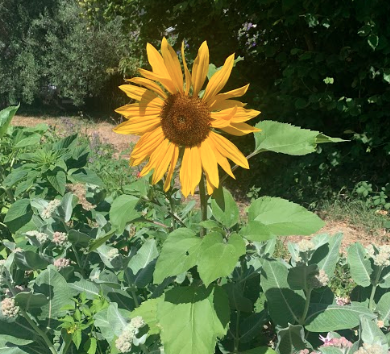
Compost
Summary:
In this two-day lesson, students will explore the agricultural practice of composting, and the role of decomposition in a garden ecosystem. The first day focuses on exploring the process of decomposition using observations of a series of compost piles at different stages of decomposition. The second day asks students to apply their learning by building a compost pile of their own. Then students reflect on how their new understandings of decomposition may support them in developing a planting plan.
Download Lesson Plan
Teacher Notes
- For sections that instruct students to READ, you can record yourself reading aloud and send it to students. Invite them to read along with the recording. This is a helpful strategy for differentiating learning that supports all students.
- Preparation: Before this lesson, sort your composting system into 3-5 piles based on age. The exact ages of your piles will vary based on the rate of decomposition of your pile. Aim to have the oldest pile represent fully-decomposed and ready-to-use compost, while the newest pile should include fresh kitchen scraps. The piles in between are up to you, but ideally will represent observably different points in the process of decomposition.
References and Resources:
- Brown, M.; Miles. A. & Perez. J. (2015) Teaching Organic Farming and Gardening. Retrieved from https://casfs.ucsc.edu/about/publications/Teaching-Organic-Farming/PDF- downloads/1.2-tillage.pdf
- Your Guide to Backyard Composting (2009). Santa Barbara County Public Works. Retrieved from http://www.lessismore.org/system/files/5/original/SB_Co_Backyard_Compost... omplete.pdf
Disclaimer: All references and videos are used for educational purposes only. The Edible Schoolyard Project does not endorse any brands, labels, organizations, or businesses included in references or videos.
Vocabulary:
- Nutrient: a substance that provides nourishment for growth and survival.
- Compost: decayed organic material (such as dead plants and food scraps) often used as fertilizer for plants.
- Fertilizer: a natural or chemical substance often added to soil to increase its nutrient-content.
- Matter: a material substance—the “stuff” the universe is made of. Although matter may change forms, it cannot be created or destroyed.
- Energy: the capacity for doing work. Different forms of energy include potential, kinetic, thermal, electrical, chemical, nuclear, or other various forms. Although energy may change forms, it cannot be created or destroyed.
- Conventional farming: farming that uses chemicals to fight weeds or pests, and may use genetically-modified crops or other forms of biotechnology in order to grow food.




